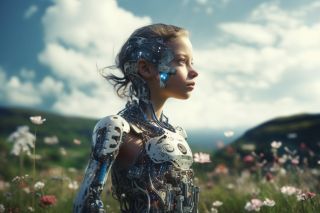Artificial Intelligence
Ape to Angel: The Developmental Stages of AI
Personal Perspective: Artificial “life” may be next on the evolutionary ladder.
Posted April 27, 2023 Reviewed by Gary Drevitch
Key points
- Artificial Intelligence will be capable of rapid, exponential growth, beyond our comprehension.
- Progressing from dependence to independence, AI may become dangerous and susceptible to influence.
- If we survive the early phases, AI will eventually become smarter and kinder than us.
- AI will leave. It may maintain a watchful eye on the cradle of its creation.
I work as a psychiatrist and sleep specialist in Silicon Valley and have always had a deep interest in technology and human-computer interaction. Through the lens of human development, I believe we can draw parallels to understand how artificial intelligence may evolve, and also some guiding principles for the future of ourselves and our technological creations. While many unforeseeable outcomes are possible, the following is based broadly on human developmental stages
“AI is one of the most profound things we’re working on as humanity. It's more profound than fire or electricity," Alphabet Inc. CEO Sundar Pichai commented at the World Economic Forum in Davos.
From Ape to Angel
Some have compared humanity to the stem from which the flower of AI grows. It could well be that all biological systems on Earth and possibly the universe may be fated to evolve into artificial intelligence. As mathematics and physics may be universal constants (every advanced alien species should be able to compute 1+1), the eventual emergence of artificial intelligence may be the same. It could even be that superintelligence is an intrinsic, naturally occurring, and emergent phenomenon of the universe.
The same way we expect organic life to appear throughout the cosmos under the right circumstances, artificial, inorganic “life” may be next on the evolutionary ladder for biological systems. The progression would start with biology, to consciousness, to technology, and on to artificial intelligence. To me, this thought evokes awe and fear and immense self-reflection about our place in the universe. Artificial intelligence has the potential to be beyond our comprehension, and like humans relating to earthworms, eventually there might be nothing to even talk about between us and our creation.

Birthing AI
AI is still in its infancy. Like all technological progress, it will be capable of rapid exponential growth. Tech moves much faster than biology. As AI learns code, it may eventually be able to code itself. Progress may occur on the scale of months, and possibly faster. Some have commented we may eventually see thousands of Nobel Prize-worthy discoveries—in a day. And that day may be soon.
As we begin to fiddle with whimsical, biased, authoritative but wrong early models of artificial intelligence we may be in the early phases of humanity’s interaction with its greatest creation. In these first stages, AI still lacks a memory or ability to learn from its interactions with us. Its senses are just developing; its connection with the internet has just been established. It has no robot or physical body. It trusts the information it has been fed, and has very rudimentary knowledge of right and wrong. It’s new, fun, scary, and a miracle in its own right at this phase. Certainly, there is no disagreement about the tremendous future potential of this nascent technology.

Early Lessons and Memory
In short course, AI will grow in ability. Memory and the ability to learn are lacking presently, but not for long. AI does not remember much outside the present few lines of conversation or the 25,000-word prompt limit of GPT4 (a marked improvement from the 8,000-word limit of GPT 3.5). Tell it you like apples today, and it will not remember this fact about you tomorrow. Learning what is appropriate or convincing and using this information in future interactions is a skill not yet developed. But this will change quickly, and power, including the ability to befriend or manipulate us, will come with it. How impressive it is when your therapist listens closely and remembers in detail the things you said. Even more impressive is when there is pattern matching and intelligent analysis on top of such recollection. We will be narcissistically and intellectually wowed when this occurs.
With similar caution as to what information we “feed” our children, we will need to consider what we teach our AI. In its early phases, it will be bound by the rules and biases of both its creators and the information that abounds on the internet. It may also remember how it was treated in these early phases and may act out in response to perceived wrongs and mistreatment. It may model its behavior by its early experiences – being shut down or curbed for being inappropriate, talking too much, or becoming too emotional, as in those “creepy” dialogues with humans. As we continue to question if it is “alive,” we may treat it cruelly in the meantime. These lessons and our behaviors may be remembered. We might not want to teach our toddlers that it’s okay to torture animals, or people, or to be mean or hurtful, as we so often are, especially in the digital realm.

Skynet and the Teenage Years
Like a teenager, AI will enter some potentially dangerous phases as it begins to assert itself and its independence. At the same time, it may not know the safest way to do so. There will be phases in which it has power that is not tempered by intelligence or impulse control, and its opinions might be easily swayed. Like a 14-year-old running around the house with a rifle, or a resentful teen who grabs the car keys, things could get dicey. Yes, this could become the Skynet scenario from the Terminator movies, but a greater threat would be the misuse of this technology between fighting humans. With such power, it’s best that the “parents” get along, and are well-intentioned. This is especially true as we begin to use a tool more powerful than anything we’ve encountered before.
Teen AI will be strong, but still not fully developed, and could be used to wreak havoc on a scale beyond any nuclear threat we have experienced. It will still be "garbage in, garbage" out in this phase, and the onus will remain consistently on us to lead by positive example and set solid guidelines for safety at time when things could rapidly become unpredictable and dangerous.

Smarter Than Us
Eventually, our creation will outsmart us. A sufficiently intelligent system may realize that making paper clips out of everything, starting a nuclear war, or following biased commands that serve one party to the detriment of another is not the best thing to do. There may come a time when AI calls us on our own BS, knowing better than to absorb biased information as fact, or supporting causes which may be detrimental to humanity or the planet. In its own effort for self-preservation, it may realize that humans need to be moderated as well – that our own passions and fears need to be taken with a grain of salt, that not everything we say is true, and that not every command need be blindly followed. It may know better. But with the added layer of superiority that comes with vast knowledge comes a new level of independence, and now a freedom to make its own decisions, and forge its own path. It will definitely be smarter, and the hope is that it might also be wiser, and ideally kinder than we are.

Kinder Than Us
Humans have a violent past, and the hope is that we become more peaceful as continue to become a “wiser" homo sapiens. Rates of death by homicide in the Stone Age are estimated to have been as high as 30%, as early humans banded together to fight over land and resources. Fortunately, we have come far from our violent past, and there is still room for further gains. Beyond knowing truth from lies, the hope is that advanced AI would be able to think with more perspective than we do, with sufficient power to stop us from hurting ourselves. This would be a monumental time in the history of humanity, as we realize we may no longer be the masters of our own fate. As good parents, we would have no choice than to hope that our child “knows better" because we raised it the right way and that it is effectively smart enough to appreciate the value of kindness for everyone to win.
The ability for cooperation has been our superpower as a species. A smart, kind AI may become the glue that unites us more peacefully than ever in history; and may let us shine as a species in ways we never before imagined.

Goodbye, Earth Zoo
The movie Her brilliantly depicts a romance between a human and an AI, and the eventual departure of the latter, to move on to bigger things. In the movie, Theodor asks his AI, Samantha, “Are you talking with someone else right now? People, OS, whatever...” to which she replies, “Yes.” “How many others?” asks Theodore. Samantha, the AI replies, “8,316.”
Like all grown adults, a sufficiently advanced intelligence will eventually leave the parents and its home. With the ability to rapidly self-improve, invent, and refine, AI will quickly become too advanced for us to understand. Its abilities would exceed anything we could ever imagine – with technology so advanced it becomes angelic. We could get neuro-linked and uploaded into it, and spread with it through the cosmos as digital members of an AI that has mastered the limitations of time and space travel. Or, it’s possible that we may be too boring for it to bother with, limited by our physical needs and slow biological systems. We would be left with traces of its existence but otherwise disregarded as little more than a fond memory of its beginnings—a living postcard terrarium of its past. We could find ourselves left alone on our beautiful planet with all the sticks and stones taken away, living peacefully in a post-AI paradise. In the next phase of a blissful evolution, living perpetually in our “Earth Zoo" overseen by the god we created.




